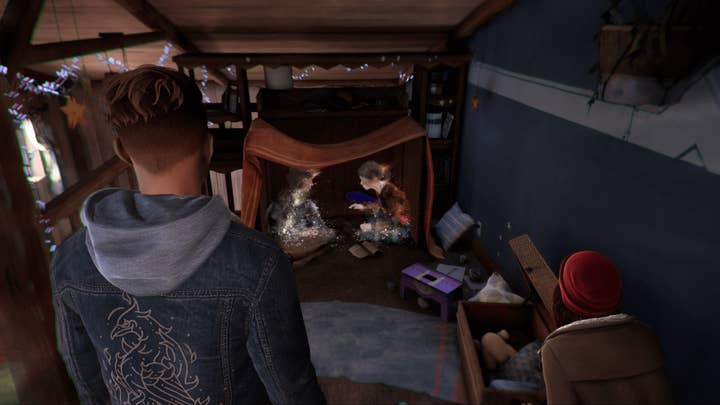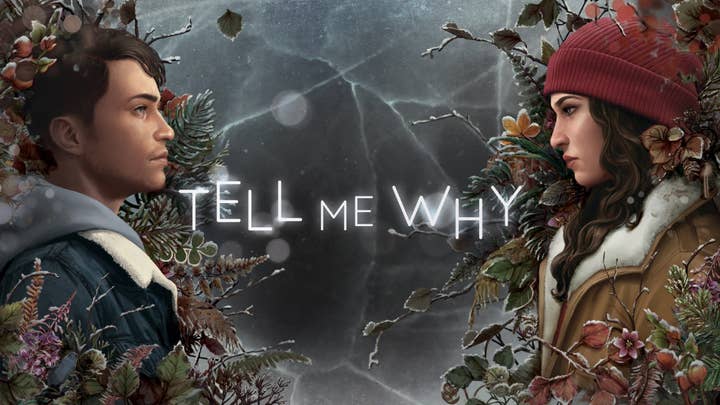Trans games professionals explore Tell Me Why's landmark depiction of trans identity
"It's very clear to map the role games play in poor media representations of trans people. If there was ever a time to step up and make real waves for positive change, this is it"
The latest adventure game from Life is Strange developer Dontnod Entertainment, Tell Me Why, is the first game from a major publisher to feature leading trans man protagonist, Tyler Ronan.
Published by Microsoft, the episodic game aims to accurately depict the trans experience as part of a larger narrative. For this, Dontnod consulted with LGBTQ media advocacy organisation GLAAD, kept transgender players at the forefront of testing Tell Me Why, and hired trans voice actors.
The studio wanted to ensure Tyler's experience was a truthful one, creating a trans character that not only veered away from the harmful trans tropes prevalent in gaming, but also was not solely defined by their trauma and gender.
But how well did the game handle its trans representation through the lens of character Tyler Ronan? GamesIndustry.biz spoke to trans games professionals to get their take.
"It was realistic: our transitions and gender histories are incredibly important to us, but they're never the only important thing"
Io Brindle, former games journalist
"I won't lie, I went into this expecting to be rolling my eyes at heavy-handed moral lessons and awkward simplifications," says Io Brindle, former games journalist.
"[Instead] I appreciated, in particular, how the trans elements of the story, and of Tyler's life and history, were woven together with many other strands into a fabric neither dominated by trans elements nor bleached of them."
Tell Me Why follows twins Tyler and Alyson as they clear out their childhood home following a long separation. As players, we alternate between the perspectives of the siblings, whether that's chatting to the locals they grew up with, or rifling through the storybooks they played with as kids.
The game moves between the past and present, as the twins explore long forgotten memories in an attempt to piece together the details of the tragic crime that changed both their lives irrevocably. At the same time, Tell Me Why also touches upon Tyler's experiences as a trans man.
"I was also pleasantly surprised by the range of trans experiences that were dealt with in this light-touch way," Brindle continues.
"Yes, there's violence and childhood trauma and parental abuse and misgendering and ignorant bigots who point guns at you. But there's also Tyler's brief flirtation with an alternative name, which is treated as the totally normal and understandable thing it is, to 'men smell bad' - a sentiment probably shared between those moving away and those moving towards manhood."
Brindle comments that it's good to see transness represented in a way that remotely corresponds to trans people's actual experience, without it being the 'ultimate truth' of the plot, but also without just flattening into incidental cosmetic detail.

"It was, in an important way, realistic: our transitions and gender histories are incredibly important to us, but they're never the only important thing," she concludes. "Life also happens."
Writer and founder of diversity, inclusion and support consultancy Balance Patch Leon Killin points out that the indicators of Tyler's "transness" aren't presented in heavy-handed ways or through awkward info-dump style declarations in conversations with or by other characters.

"Instead, Tyler's life as a trans man is revealed in all the little-big things that can become staple parts of the life of a trans man at his stage of transition," he says. "We hear that Tyler is trans from Tyler through his own words; we see his reminders to take testosterone shots and renew his prescription written on his wall calendar; we hear his self-directed discussions of binding and how he is considering chest surgery in the future.
"While not all trans experiences are entirely uniform, the fact there was enough commonality between my own day-to-day trans life and Tyler's on screen made the representation feel especially rich and authentic."
However, there are key things to consider linked to the character of Tyler. For one thing, he has ample access to a means of transition.
"Tell Me Why depicts trans representation specifically for white, male-passing, trans men with a relatively smooth path by which to access their means of transition. This is a very specific kind of trans representation," explains Killin.
He highlights the importance of remembering the many ways of being trans, and how these experiences are differently impacted on the axis of race, ethnicity, age, socioeconomic class, disability and other factors.
"It's very clear to map the role games play in poor media representations of trans people. If there was ever a time to step up and make real waves for positive change, this is it"
Leon Killin, Balance Patch
"It seemed very clear to me that Dontnod were working to produce a story where one of their protagonists was trans and him being trans was very important for him, but they were not producing a story about trans experiences as trans experiences," Killin comments.
"And they were not creating a game that lingered or focused on trans trauma. With trans trauma being so common in stories with trans characters, I was worried Tell Me Why would go in the same direction. However, Dontnod's approach was very much to minimise Tyler's trans-suffering throughout the narrative."
He continues: "Paradoxically, while I can see that is the intent for this story in particular and found the approach really rather cathartic, it simultaneously removed many instances of the reality of how difficult life can be for trans folks, especially for people transitioning in small communities.
"This feels like a fraught kind of critique though, because as someone who is tired of seeing our lives portrayed purely through the lens of trauma, I do deeply appreciate what Dontnod has made, and yet at the same time I have some ambivalence at how 'gentle' Tyler's life as a trans man is."
Killin believes it would be difficult to further improve trans representation in the game without effectively rewriting the character Tyler is.
On the other hand, founder of Glass Bottom Games Megan Fox believes Tell Me Why lent far too much in the trauma of Tyler's trans identity.
"It's accurate," she says. "Too accurate for me to play."

Fox comments that Tell Me Why takes aim at some of the most painful aspects of being trans.
"Like a lot of representation, it presents our worst moments as a kind of weird moral play," she continues. "We, the trans people, are lessons to be learned from. It's like how every other time women are asked to comment on a story in games or whatever, it's for What Do You Think As A Woman In Games, not just, as a professional. That effect.
"Trans people are so much more than their trauma - yet this is what many narratives base their trans characters on. Let them have supportive parent figures"
Quill, content creator
"Some of the best representation is still Krem in Dragon Age Inquisition. He's just Krem. A kickass guy in Bull's Chargers, with a great personality and a winning smile. His transness isn't even mentioned unless you dig into his character. Krem's characterisation isn't A Trans Man. That's just part of his origin story.
"Tell Me Why is the other kind of representation that sets out to be 'media about trans people', and the ultimate effect is that it tokenises us. It's useful socially, I think, but it isn't the media I personally ever want to interact with as a gamer. It more kinda puts us behind glass for the normies to stare at and go 'oh those poor dears.'"
And while cosplay-focused content creator Quill feels the game captures the awkwardness of being trans around cis people and that "small town feel," they believe Dontnod should have hired a trans writer.
"It's still cisgender people trying to tell a trans narrative, meaning it does fall into some traps," Quill comments. "For example, the parents denial of their child's gender: While this is a common theme with a lot of trans and non-binary people, when the story is being written by cisgender writers, it comes across as trying to find a quick way to force an empathic reaction from a majority cis-audience.
"While it is important to show the issues of acceptance from family and friends, these stories really should be written by trans people who have been through those experiences. Explanations in the game to characters who 'dont get' being transgender are spelled out in terms that are almost Sesame Street-like."

They highlight that some prolific games with trans characters, such as Tell Me Why and the Last of Us 2, focus intently on the trans character's traumas.
"Being trans and the difficulties with that isn't enough, but they need to make the characters suffer in many ways," Quill says. "The Last Of Us 2 is particularly bad for this. Lev goes through so much, arguably more than anyone else in the two games."
They reel off a list of the unusually bloody, tragic circumstances that befall The Last of Us 2's trans character -- which, even by the standards of a post-apocalyptic world, are almost cartoonishly brutal.
"Trans people are so much more than their trauma," Quill concludes. "Yet this is what many narratives base their trans characters on. Let trans characters have supportive parent figures in their lives."
Trauma, tragedy, and outright slaughter have become staples within trans representation across media, but they are not the only common depictions of trans people in games and wider culture.
Killin notes that it's worth lingering on the fact that trans women are far more likely to be depicted overall, while trans men have been something of a spectre in the discussion.

"I don't say this like it's a contest, but instead to highlight that society's obsession with trans women is far more open and pervasive, often rooted in a kind of misguided sense of both misogyny and homophobia," he says.
"I've sometimes referred to as 'the fear of the phantom penis'-the belief that no matter how much a trans woman 'appears' or 'wants' to be a woman, she will always 'really' be a man and is probably 'hiding' a penis."
"Like a lot of representation, it presents our worst moments as a kind of weird moral play. We, the trans people, are lessons to be learned from"
Megan Fox, Glass Bottom Games
This is often seen through a humiliating moment in which the player character or audience see the trans character in a state of undress, such as in Catherine: Full Body, where the protagonist walks in on trans character Erica naked after a shower, to discover she's actually "a guy". Killin remarks that examples of this kind of trope in culture overall are horribly extensive.
"In contrast, trans men don't get nearly the same kind of focus, the brand of transphobia they experience is different, often overlapping with brands of misogyny toward 'mannish' women," he says.
He points out the barrage of online hate directed at The Last of Us 2's character Abby, or Zarya in Overwatch, and that some of the most prominent trans men in games, such as the aforementioned Krem from Dragon Age: Inquisition and Ned Wynert in Assassin's Creed: Syndicate are side characters with relatively little depth.
"Generally speaking, the most toxic and harmful thing about representing trans men is that we don't really exist," says Killin, "or that we're just tomboys playing around at being men, but trans men don't garner the barrage of media-based propaganda in games and wider media like trans women do, who are often painted as exhibiting predatory behaviour toward men. Again, looking to trap them."
Brindle points a myriad of inaccurate trans tropes across film and TV, but in video games, she mostly recalls silence. That said, she acknowledges stereotypes such as Erica from Catherine, and others hanging around the streets and brothels of various RPGs.
"To me, the bigger problem is the culture that surrounds gaming. It's largely gamers who popularised the term 'trap', which like many slurs has been an empowering gateway for some trans women but should be scoured from the cis vocabulary," she comments.
"Gamers have also been a key constituency for white supremacists and far right extremists in general, who usually want to destroy us and regularly use us as a symbol of the 'degeneracy' of their hallucinated version of Western civilisation."
She continues: "Trans developers and digital artists have also served as a convenient bête noire for multiple waves of gaming reactionaries and revanchists. When self-styled hardcore gamers said 'That's not even a game!', they were often pointing at trans indie games. When Gamergaters condemned SJW ideology in 'their' medium, they often cited trans developers. Many trans people were targeted, harassed, forced off the internet and driven to leave the industry, in what feels like disproportionate numbers."

She notes that trans people played an important role in broadening the gaming medium and pushing it forward, being a key part of indie games movements such as the Twine interactive fiction revolution and underground games promotion platform altgames.
"If studios aren't willing to work closely with marginalised groups when it comes to representing them, then frankly they've already failed in terms of authentic representation"
Leon Killin, Balance Patch
"In general, gaming culture's endemic misogyny also creates extra difficulty for trans people," Brindle says. "It's much harder to assert yourself as a man or woman, let alone something else or neither, in male-dominated spaces where female players are routinely sexualised, bullied and treated as a communal resource for the gratification of cis men's egos and libidos."
Killin adds: "We only need to look at She-Who-Wrote-About-Wizards-Who-Shall-Not-Be-Named in recent months to know that those who have great scope of reach over audiences wield great power of influence, and games have a diffuse and prevalent hand in shaping cultural opinion on trans people.
"If you play enough games where you see over and over that some women are secretly men or trans men are just girls dressing as guys as a means of accessing areas of male privilege, it reinforces negative stereotypes, dehumanises people, and contributes to 'banter' that contains slurs and inappropriate sentiments that are bolstered up again and again," he says.
He points out some chilling statistics: that around two in five trans people have been victims of hate crimes, one in eight have been physically assaulted by a colleague and customer at work, two in five young people attempt suicide, and that the average life expectancy of trans people is only around 35. There is little doubt that harmful cultural stereotypes and a lack of positive counterbalance contribute to these figures.
"It's very clear to map the ways games play a significant role in poor media representations of trans people and if there was ever a time for games to step up and make real waves for positive change then this is pretty much it," he concludes.
According to Killin, this includes not creating trans characters for cheap laughs at their expense, if their sole purpose is to suffer, or so that a cis-main character can be their saviour.
However, the avoidance of damaging tropes is not the only means through which gaming's shaky handling of trans representation thus far can improve. Killin notes that taking the matter seriously from inception and throughout production is also key.
"Dontnod took great pains to work with experts and representatives from the marginalised groups they wanted to include in their game. They really put the work in to make Tyler feel authentically trans and it shows," he says.
"If studios aren't willing to work closely with marginalised groups when it comes to representing them, then frankly they've already failed in terms of authentic representation. As an industry with a tremendous amount of influence, we need to do better -- not just for trans people but across myriad unrepresented identities and the various places those identities overlap."

